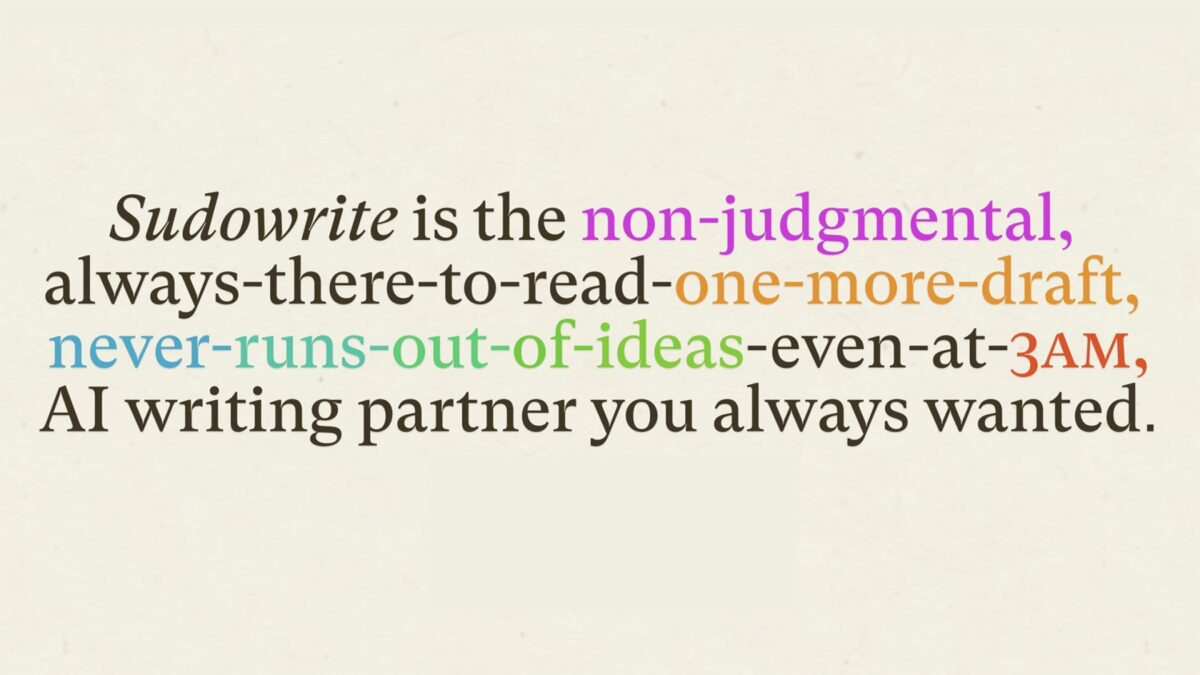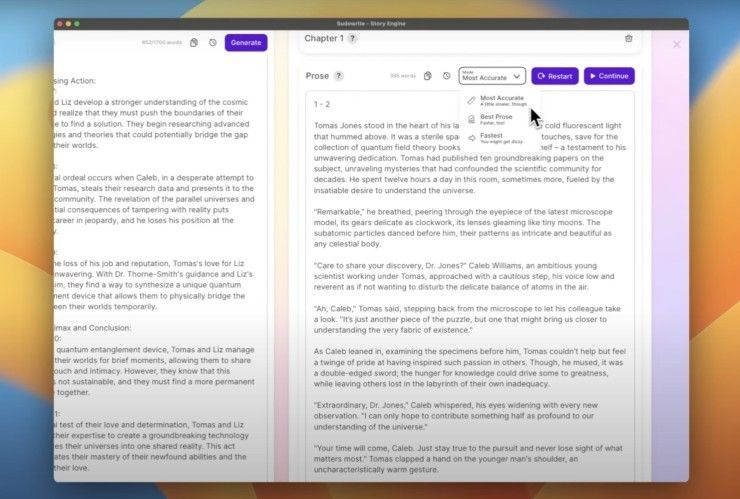
Twitter and Reddit are ablaze after the reveal of a new tool that is said to help writers create at the speed of AI.
I love technology. While I studied English Literature during my undergrad and received a Masters’s in screenwriting, I have always been drawn to our collective ability to create incredible tools and machines. Every week I dig deep into the technological innovations we create. I follow several machinists who share their processes, technology, and fabrication techniques.
I even dabbled in coding before my brain melted and decided it was best appreciated from afar. And that’s just the tip of the iceberg of my love of tech.
I say this because I don’t want what comes next to be the words of an “angry writer.”
Because I’m not angry, I just feel a sense of dread.
First, we have to talk about why the writers on Twitter and Reddit are lighting their torches.
The Sudowrite Story Engine
I will start with praise because, in all honestly, this is an incredible tool that is leveraging AI to support my writing ability. It’s a tool that I think I’ve always wanted.
Sudowrite is an AI application that uses several variants of GPT-3 (created by OpenAI) to help writers overcome writer’s block, write faster, and refine their work to what they really want it to be.
With the newly released Story Engine, Sudowrite founder James You has created a tool that now lets writers create an entire novel in mere days. From a simple idea to a complete first draft. Prose and all. Here’s a video of Yu explaining the application and workflow:
I can’t tell you how many times I’ve had my story worked out but have been stuck on plot. There have been equally as many times where the opposite has been true. On occasion, I also get stuck on creating compelling characters.
With Story Engine, I can have AI support me in generating not only my synopsis but also my story beats, characters, and even my chapters, all from my own ideas and brainstorming sessions. Even though I’m a feature film screenwriter, this is a tool that will let me get to writing instead of breaking apart the myriad of ideas that cloud my creative inspiration.
It could even help me rewrite those pesky action blocks, as the Sudowrite website claims—“You could rewrite the same sentence 100 times… or you could make the computer do it.”
So, why is my heart sinking in my chest right now?
Putting the Cart Before the Horse
In high school, I spent hours ignoring my classes just to write stories in my notebook. I dissected the poetry of Henry Wadsworth Longfellow and the stories of King Arthur in their original Old English while in my undergrad. While getting my Masters at UCLA, I hammered into my brain the countless different story structures and rules for making a good story. It was my Rocky training montage.
I’m saying this not to toot my own horn but to give readers an understanding of what writers go through to gain the tools necessary to write a compelling story.
Even after reading the comments from Twitter and Reddit (which we’ll get to below), I was excited to see Story Engine at work. Remember, I love technology. But the more Yu explained the application and the workflow, the more I realized the issues of this new tech.
Story Engine’s biggest features are the generation of story ideas and beats, characters and characters descriptions, and even essential plot points supported by story structure and rules. But for a writer to get all these things on the page, the one question a writer must ask is…Why?
Why is a story beat important? What is it exploring about your theme and your genre? Why is a character given a name? How is it important to the story? How and why does the story support the plot? All of these building blocks are essential to creating the moments, characters, beats, and interactions of your story. Without the why, all you have is just text without meaning.
And the reason we read, watch, and listen to stories, is to uncover that meaning. Either for our own enjoyment or for the exploration of themes that may help us grow.
With Story Engine, I’m not seeing any of that. While it is a fantastic tool for generating characters and plot points, they aren’t built upon a solid foundation. They are devoid of the reason why they should exist.
Sure, writers can fill in the gaps later, but you can’t create a compelling story idea and then give it meaning. It is a linear process that requires the latter to come first. We must have a horse to pull the cart along the writing journey, but from what I see with Story Engine, we have a super nice cart and no horse in sight.
Writer or Co-Writer?
Yu calls the Story Engine a “highly collaborative interface.” You give the AI your ideas, and it spits our prose based on your idea. Then you can rewrite and make it better. Because believe me, even with the tech where it is now, you will have to rewrite. The output you receive is vague at best.
But here is a question—are you now the writer? Or are you the co-writer? Are you even that?
With Story Engine, you can generate a full draft without ever writing a word of prose. You did none of the writing. Sure, you can rewrite it to “make it your own,” but that just feels like I’m an editor.

The brilliance of writing comes from the exploration of writing every word, and in writing, be it novels or screenwriting, every word is crucial. If you have even a single word that isn’t in service of the story, it shouldn’t be there.
With Story Engine, none of those words are in service to the story. They are AI-generated fillers from the ideas you gave. If I wrote a novel with Story Engine and didn’t rewrite every single word to suit my story, I’d just feel like a co-writer at best and a reader at worst.
But how is Story Engine generating this prose?
Twitter and Reddit
This is where we get into the scandal of it al. AI tools that generate images and text is “trained” on data sets. If you want a picture of something, you would need to use an AI that has been fed countless images and descriptions of those images.
It would then utilize its training to recreate an image to suit your prompt. If you want a bear riding a tricycle, you’re going to get it, but someone would have already had to create the bear and the tricycle.
The same goes for text. Sudowrite claims that the application is guessing the next word after being trained on a mind-numbing selection of prose.
This training is where things get muddy. According to a Twitter post by author SD Simper (and the accompanying Reddit post), the underlying technology that makes Story Engine work has been utilizing the work of countless writers to train its AI language model.
Care to comment on how you stole work from Ao3 to feed your machine?
Links in the article: https://t.co/UwtnJPKkWJ https://t.co/fYtpSwcH0M
— SD Simper finished her rough draft (@sdsimper) May 18, 2023
According to the Sudowrite FAQ, the application utilizes “OpenAI trained GPT-3 on: (1) a version of the CommonCrawl dataset, filtered based on similarity to high-quality reference corpora, (2) an expanded version of the Webtext dataset, (3) two internet-based book corpora, and (4) English-language Wikipedia.”
The team at Sudowrite then “pairs GPT-3 with a variety of proprietary narrative model-based and algorithmic pre- and post-processing to enable AI writing features not available anywhere else.”
Cool, huh? Well, here’s the problem, all that work that the AI was trained on was done by someone else.
I will admit that my understanding of the fundamental architecture for this tech is a bit beyond me at the moment but whatever Story Engine is outputting has been built on the backs of hard-working writers who have spent hours discovering a way to write compelling stories.
This is why we got Twitter comments like:
There is a whole conversation to be had about copyright when it comes to AI. But some of the above data sets aren’t protected under copyright, right? They are created for the enjoyment of others under licenses that make them accessible to all. Legally, everything with AI might be crystal clear. However, as history has taught us, not everything that was once legal (or still is) is right.
Praise, Fear, and Hate
No one wants to be replaced. I think I feel the same thing that coal miners do when wind and solar farms became an affordable solution for power. Or when a combine could do the same work that dozens of farmhands could do.
Writing may seem like “not a real job.” Something whimsical that only rich people with loads of time are able to do or even appreciate. But telling stories is a fundamental core of what makes us human and what connects us. It’s even older than agriculture.
But just like solar panels and combines, AI is here to stay. It’s a technology that is crucial to our growth and will forever change humanity.
This is why I can’t help but praise a tool like Story Engine. I can already see it being able to comfort the busy part of my brain and help me craft my ideas into a story. But I don’t think it should.
Our very own Jason Hellerman, a WGA screenwriter with produced filmed under his belt, says it best. “Part of the glory of writing is the pain of figuring it out yourself. The thing is, no computer is ever going to be able to replicate your point of view or perspective. It hasn’t lived your life or the lives of the characters you’ve created. Breaking a story is supposed to be hard because the best stories in film, TV, and novels are ones that connect to the soul. The ones that pull out of us exactly what it means to have a human experience. Using AI to replicate that is neutering the very reason most of us write. And it’s bastardizing that connection, chalking it up to plot points instead of what it really is: magic.”
I am the writer I am today because I’ve spent the past 23 years learning, writing, and struggling to perfect my craft. While Story Engine can help me be a better writer, it can only do so because of the time I have already invested.
If we were to flash forward another 23 years and Sudowrite’s Story Engine had been a raging success for all that time, what kind of writers would we have? Another writer had a great perspective on it as well.
As a former creator of collaborative software, the one thing my product team held sacred was NOT to automate/replace the creative process but facilitate it. I’m sure the intentions here are good, but the product brief seems greatly flawed. I write because I am a writer and…
— Taylor Tyng (@taylortyng) May 18, 2023
Anything worth doing is going to be hard. The reason that the craft of writing and storytelling is still so compelling, even after thousands of years from when it started, is because it was hard.
We can’t make it easy. Then it just won’t be worth doing anymore. No pain, no gain, right?
But what do you think? Is this the tool you’ve been waiting for? Let us know in the comments!














